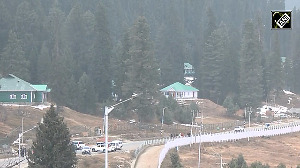Train services, which were disrupted since Monday in the wake of violence in some parts of Punjab over the attack on a sect leader in Vienna, resumed on Tuesday even as thousands of passengers, including Vaishnodevi pilgrims, remained stranded at the railway station in Jammu.
"Rail services have been resumed at Jammu station with the Tata Mori train leaving from here at 4 pm," said Deputy Superintendent of Police (Railways) Maqsood Shah. The Railways had cancelled 19 trains passing through Jammu after violence broke out in Jalandhar and other neighbouring districts of Punjab, leaving over 15,000 passengers stranded at Jammu railway station.
Two social organisations and the state unit of Vishwa Hindu Parishad have organised community kitchens at the railway station since Monday to provide food for the stranded pilgrims.
The number of stranded passengers is likely to go up as pilgrims will continue to return from Vaishnodevi shrine.
Several hundred passengers have already left for Delhi and other stations through alternative modes of road transport.
Senior district officers of Jammu and Senior Superintendent of Police (Jammu) Manohar Singh have visited the railway station and were monitoring basic amenities like water, medicines and food for the passengers.
Authorities have also set up some mobile toilet vans for the convenience of the stranded people.
Nearly 300 followers of Guru Ravi Dass Sabha had taken out a peaceful protest march in Jammu on Tuesday to protest the death of Dera Sachkhand leader Sant Rama Nand, who was killed in Vienna.





